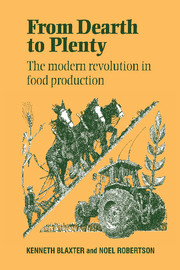Book contents
- Frontmatter
- Contents
- Preface
- Acknowledgements
- PART ONE The social, economic and political context of agricultural change
- PART TWO The science and technology of the modern agricultural revolution
- PART THREE How did the science-based revolution happen, and what is the way forward as support is withdrawn?
- Glossary
- Index
Preface
Published online by Cambridge University Press: 04 August 2010
- Frontmatter
- Contents
- Preface
- Acknowledgements
- PART ONE The social, economic and political context of agricultural change
- PART TWO The science and technology of the modern agricultural revolution
- PART THREE How did the science-based revolution happen, and what is the way forward as support is withdrawn?
- Glossary
- Index
Summary
This book, which is concerned with the contributions of science to the progress of farming, particularly in the United Kingdom, was conceived in both pride and anger. Pride in the accomplishment of the many men and women, whether farmers or scientists, who transformed agriculture over the past half century, so that food could be provided from our resources of land and climate to meet the nutritional needs of the nation. Pride too in the fact that I have been privileged to know many of them. And anger? Anger that these gifted, often self-effacing people have not received the acclaim that is rightly their due. Jonathan Swift in 1727 recorded in Gulliver's Travels that the King of Brobdingnag ‘…gave it for his opinion, that whoever could make two ears of corn or two blades of grass, to grow upon a spot of ground where only one grew before, would deserve better of mankind, and do more essential service to his country, than the whole race of politicians put together’. Over 250 years ago, Swift recognised the accomplishment of those concerned with the then technology of farming and the contribution they made to the common weal. This we may well have forgotten in our age of affluence when hunger is no longer commonplace. It is wrong to have done so.
- Type
- Chapter
- Information
- From Dearth to PlentyThe Modern Revolution in Food Production, pp. xi - xivPublisher: Cambridge University PressPrint publication year: 1995



